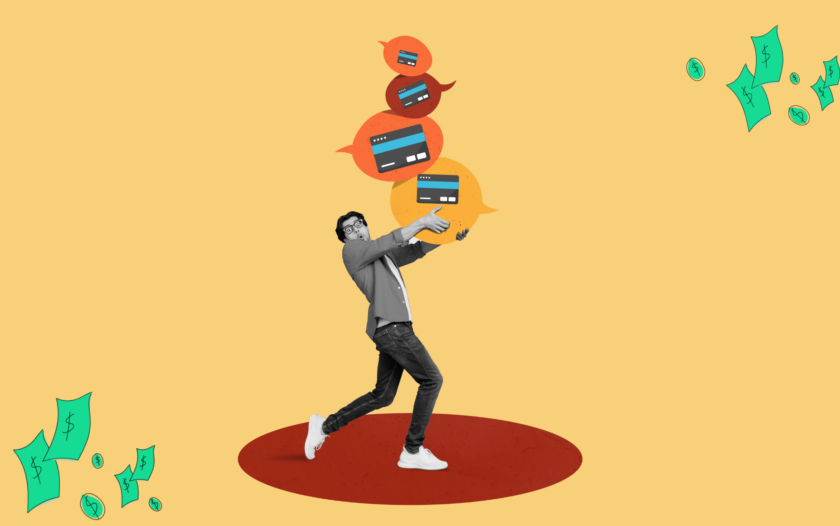Credit Card Default: Everything You Should Know
About Harrison
Harrison Pierce is a writer and a digital nomad, specializing in personal finance with a focus on credit cards. He is a graduate of the University of North Carolina at Chapel Hill with a major in sociology and is currently traveling the world.
Read full bio
At a Glance
Credit card default can have severe consequences on your financial well-being. Understanding what credit card default means, how it happens, and its implications is crucial. Here is a comprehensive overview of credit card default, its consequences, and steps you can take to manage the situation.
In this article, you’ll learn:
The proportion of people that feel confident they can pay their next credit card bill. 50%


What does credit default mean?
Credit card default occurs when you fail to make the minimum required payments on your credit card for an extended period. It is a serious financial issue that can have long-lasting effects on your credit history and overall financial health.
How does credit card default happen?
Credit card default can happen due to various reasons, such as financial hardship, unexpected expenses, or poor financial management. It may occur when you consistently miss payments, make late payments, or fail to pay the required minimum amount.
What happens if you default on a credit card?
When you default on a credit card, several consequences can arise:
1. Increase in interest
Once you default, your credit card issuer can raise the interest rate on your account. This can significantly increase the amount you owe and make it harder to repay the debt.
2. Collection effort increases
Credit card issuers may intensify their collection efforts to recover the outstanding balance. They may contact you frequently through calls, letters, or even engage third-party debt collectors.
3. Impacts on credit card report
Defaulting on a credit card can severely impact your credit card report. The late payments and default status will be recorded and can remain on your credit history for several years, making it difficult to obtain credit in the future.
4. Credit limit will decrease
Credit card issuers might reduce your credit limit or even suspend your card privileges altogether. This reduction in available credit can further affect your financial flexibility.
5. Legal consequences
In extreme cases, credit card issuers may take legal action against you to recover the outstanding balance. This can result in lawsuits, court judgments, and potential wage garnishment.
6. Wage garnishment
If you default on your credit card, your wages can be garnished in certain circumstances, but it typically requires legal action. Garnishment is a legal process through which your employer can withhold a portion of your wages to repay a debt. The specific rules and limitations regarding wage garnishment vary by jurisdiction, so it’s important to consult local laws or seek legal advice to understand the rules that apply to your situation.
What to do about credit card default?
If you find yourself in a credit card default situation, here are some steps you can take:
1. Repay the amount
The first and most important step is to repay the outstanding amount immediately. Prioritize paying off your debts to minimize the negative consequences.
2. Contact issuer
Reach out to your credit card issuer to explain your situation. They may be willing to work with you by offering alternative payment arrangements or debt management options.
3. Debt management
Consider enrolling in a debt management program through a reputable credit counseling agency. These programs can help you create a budget, negotiate with creditors, and develop a plan to repay your debts over time.
4. Bankruptcy
In extreme cases where the debt burden is overwhelming, and other options are not feasible, filing for bankruptcy may be an option to consider. However, this should only be a last resort due to its long-term impact on your credit.
5. Debt settlement
Negotiating a debt settlement with your credit card issuer or collection agency may be possible. This involves offering a lump sum payment to settle the debt for less than the total amount owed.
How does credit card default affect your score?
Credit card default has a significant negative impact on your credit score. Late payments and default status can lower your score, making it harder to obtain credit in the future. It can take several years of responsible financial behavior to rebuild your credit after a default.
How long does a default stay on your credit?
A default typically stays on your credit report for up to seven years from the date of the first missed payment. It is crucial to rectify the situation and demonstrate responsible financial behavior during this time.
Dealing with fallout and moving forward
Recovering from a credit card default takes time and effort. Focus on rebuilding your credit by making timely payments, reducing debt, and practicing good financial habits. Consult with a financial advisor or credit counselor for personalized guidance.
FAQs
No, defaulting on a credit card cannot result in an arrest. However, it can lead to legal action and potential consequences such as wage garnishment. Paying the default won’t have an immediate direct impact on your credit score but over time, however, your score will gradually improve as the default ages. Plus, some lenders will only lend once the defaults are cleared. Therefore, paying the default as quickly as possible is in your best interest as it shows responsible behavior and can help rebuild your credit over time. In some cases, you may be able to negotiate with the credit card issuer or dispute the default entry if it was reported inaccurately. However, legitimate defaults cannot be removed until the specified time has passed. Paying off a default does not result in its immediate removal from your credit report. It will still remain on your report for the specified duration, usually seven years. However, it shows potential lenders that you have resolved the debt.









